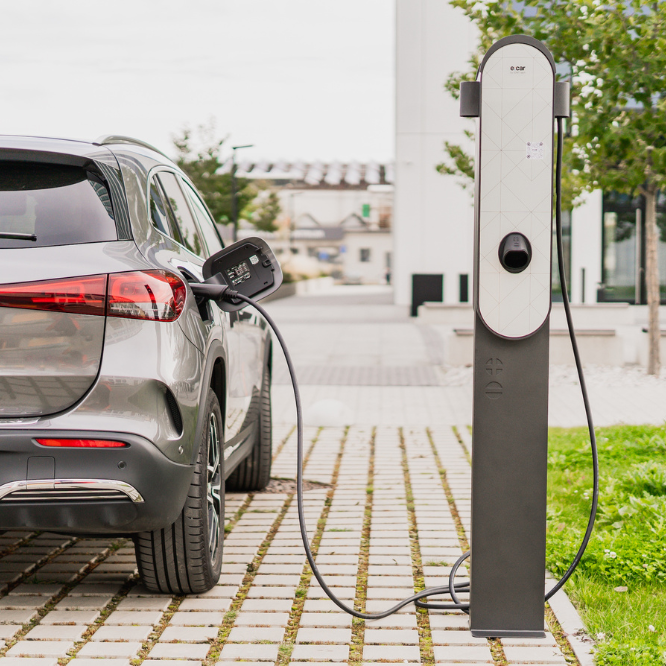Na co si dát pozor při pořízení dobíjecí stanice do firmy
Firmy se pro pořízení dobíjecí stanice rozhodují z nejrůznějších důvodů. Každý z nich má svá specifika a neexistuje univerzální řešení vhodné pro každé zadání. Na počátku je potřeba si ujasnit, jak by stanice měla fungovat a co by měla umožňovat. Tuto specifikaci můžeme společně definovat. Kontaktujte nás, rádi vám s výběrem dobíjení do vaší firmy pomůžeme. Některé z vlastností stanic jsou spíše praktické, jiné ekonomické, ale je potřeba zohlednit i zákonné požadavky.

Nabíjení fleetu
Chcete dobíjet firemní vozy? Potom určitě potřebujete evidovat náklady za nabíjení a mít kontrolu nad dobíjením. S dobíjecími stanice od IONT tech můžete nastavovat rychlost dobíjení, omezovat jejich výkon, nebo načasovat začátek dobíjení. Optimalizovat náklady a zajistit, aby byly vozy stále připravené s plnou baterií.

Veřejná dobíjecí stanice
má svá specifika. Taková stanice bude vítána nejen návštěvníky vaší firmy, ale i zaměstnanci, jako benefit na pracovišti. Stanici je možné provozovat s využitím čipové karty pro zaměstnance, nebo jako veřejnou pro kohokoliv. Je však třeba zohlednit nařízení AFIR, které definuje provoz veřejné dobíjecí stanice.
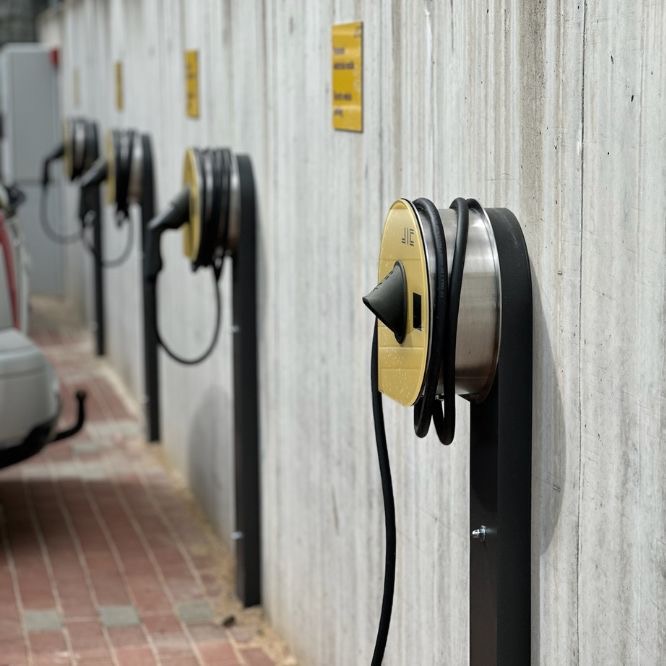
Povinnost vlastníka stavby
Podle § 167 nového stavebního zákona č. 283/2021 Sb. má vlastník stavby či zařízení (firma), která není určena pro bydlení a má více než 20 parkovacích míst, povinnost do 1. ledna 2025 zajistit instalaci alespoň jedné dobíjecí stanice pro elektromobily.
Rychlou nebo pomalou?
Každá firma má specifický provoz. Jiné nároky bude mít kurýr, jiné potřeby bude mít firma s výrobou a parkovištěm, kde auta stojí několik hodin.
Pro spediční firmu, záchrannou službu nebo kurýra hraje čas důležitou roli. V tomto případě platí víc, než kde jinde, že čas je drahý.
Pořízení rychlé dobíjecí stanice do firmy není malou investicí, ale umožní vám být stále připravení na cestu. Rychlé dobíjecí stanice jsou mnohem nákladnější a s každým dalším kW výkonu razantně narůstá cena. Je proto důležité zohlednit, zda se do vaší firmy taková stanice s ohledem na provoz vyplatí.
Pomalé stanice možná neprávem zasluhují označení pomalé. Výkon 22 kW určitě není k zahození a taková stanice dokáže dostatečně rychle nabít nejen referentské vozy, ale celou firemní flotilu. Ve většině firem stojí vozy hodiny, případně přes noc.
Výběr dobíjení není jen o samotné stanici. Tu je potřeba vybrat s ohledem na spotřebu celé budovy a jištění. Pokud si nevíte s výběrem rady, neváhejte se na nás obrátit.
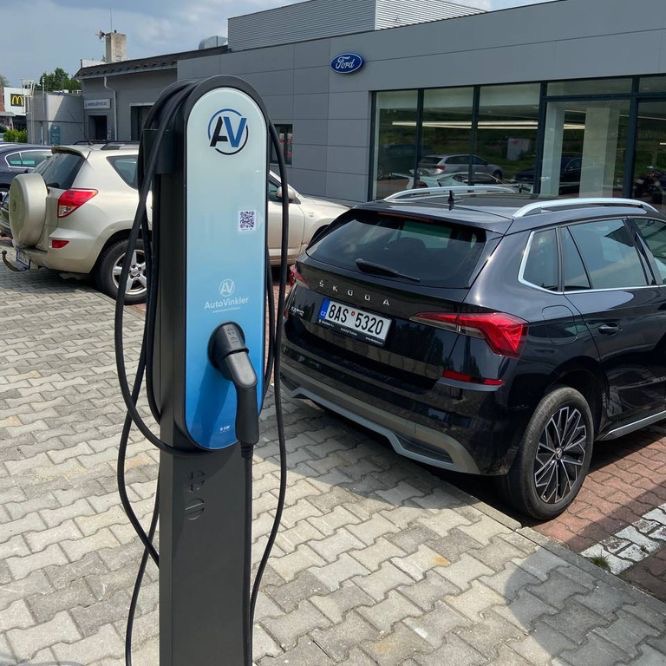
AC stanice s výkonem do 22 kW
Pomalá dobíjecí stanice s výkonem až 2x22 kW, tedy pro současné dobíjení dvou vozů s výkonem 22 kW lze využít jako základ pro dobíjecí infrastrukturu každé firmy. Stanici lze modifikovat pro různé formy použití. Přes autorizaci RFID čipem, po vybavení displejem, aby stanice splňovala nařízení AFIR a bylo ji možné provozovat jako veřejnou.

DC stanice s výkonem od 40 kW
IONT tech nabízí firemním zákazníkům DC rychlou dobíjecí stanici. Díky vlastní výrobě máme možnost škálovat její výkon, který začíná na 40 kW. Stanice je primárně osazena jedním kabelem, možné jsou i dva vývody. Stanici DC WALL je možné umístit na stěnu i na stojan volně do prostoru. Rychlé dobíjení řešíme vždy individuálně, nenajdete ji proto u nás v e-shopu. Contact us pro více informací.
Company cars charging and cost examples
Charging company vehicles is becoming an increasingly important part of business operations. The growing interest in electromobility and the need to reduce emissions brings both challenges and opportunities for fleet managers. With our comprehensive EV charging solution, you can ensure efficient and sustainable operation of your fleet.
This example shows that charging costs can be significantly influenced by the charging location. With our charging solution, you can easily monitor and manage the charging costs of individual drivers in your fleet and optimise your business operations.
To find out more about how we can help you optimise charging for your company fleet, contact us today and we'll be happy to introduce you to our services and capabilities.
Case study of corporate charging
Driver A
Conditions
Where is moving City
Annual mileage 40 000 km
Price of electricity AC Home / Office AC 5kW 5,80 CZK
Price of electricity DC Highway DC 60 kW 18,-CZK
Price of electricity local charger AC 20kW 8,-CZK
Electricity consumption estimate 25 kWh
After how many km usually charge 250km
Number of charges per month
Home / Office AC 5 kW 5x
Dálnice DC 60 kW 5x
Local charger AC 20 kW 4x
Charging cycle length
Home / Office AC 5 kW 12 hour
Highway DC 60 kW 1 hour
Local charger AC 20 kW 1 hour
Cost
Home / Office ACC 5 kW 1740,-CZK
Highway DC 60 kW 5400,-CZK
Local charger AC 20 kW 640,- CZK
Monthly charging costs 7780,-CZK
Working time spent charging 9 hours
Driver B
Conditions
Where is moving Outside the city
Annual mileage 40 000 km
Price of electricity AC Home / Office AC 5kW 5,80 CZK
Price of electricity DC Highway DC 60 kW 18,-CZK
Price of electricity local charger AC 20kW 8,-CZK
Electricity consumption estimate 25 kWh
After how many km usually charge 250km
Number of charges per month
Home / Office AC 5 kW 10x
Highway DC 60 kW 2x
Local charger AC 20 kW 2x
Charging cycle length
Home / Office AC 5 kW 12 hour
Highway DC 60 kW 1 hour
Local charger AC 20 kW 1 hour
Cost
Home / Office ACC 5 kW 3480,-CZK
Highway DC 60 kW 2160,-CZK
Local charger AC 20 kW 320,- CZK
Monthly charging costs 5960,-CZK
Working time spent charging 4 hours
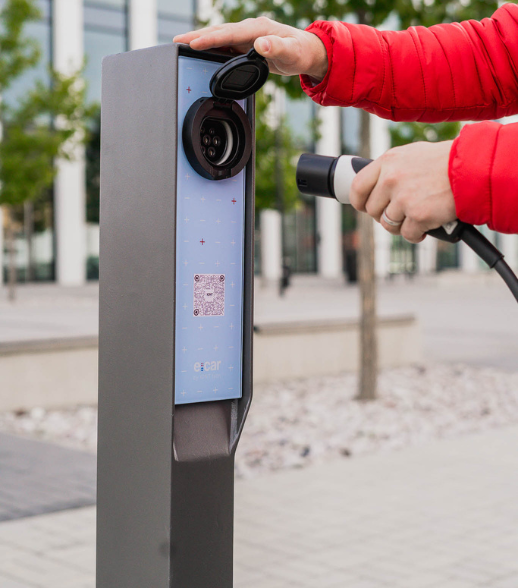
Charging your company car at home
Charging with a home charger
Measurement by "smart device proof" - e.g. wallbox with electricity meter.
According to the actual price
Or by actual price and measured consumption. Attention to the meter - it must be a so-called billing meter in the wall, i.e. a class A meter
Wallbox
Charging with a domestic charger for the company car is covered by the Income Tax Act, at a flat rate of 6 CZK per kWh. The employee's income is not taxable income.
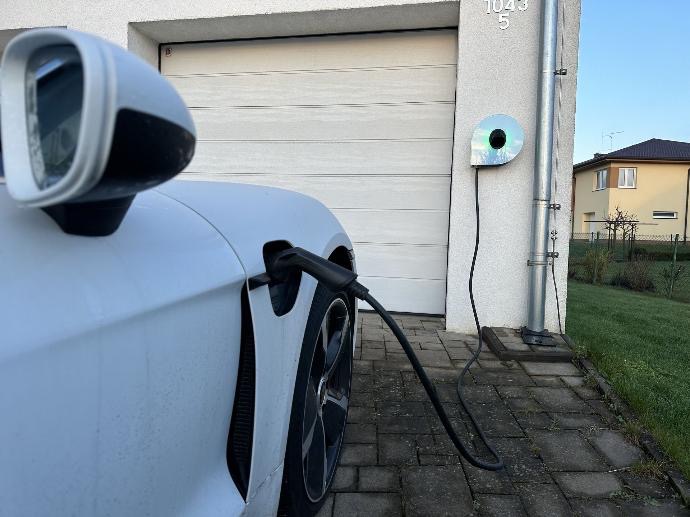
Price of petrol for employees
is determined by Decree No 467/2022 Coll. The average fuel prices for the purpose of providing travel allowances to employees for 2023 are set.
Electricity
8,20 CZK / kWh
Diesel
44,10 CZK / l
Gasoline
41,20 CZK / l
Charging at the workplace
Charging electric vehicles at the workplace, often referred to as "workplace charging", brings a number of benefits for companies and employees. Here are some of the main benefits of this approach:
- Workplace charging supports employees who own EVs and motivates them to switch to a more sustainable mode of transport.
- On-site charging allows employees to extend the range of their EVs. This can be useful if they have a longer work trip or if they need a vehicle for work trips during the day.
- The company can have control over the price of electricity, which can lead to lower charging costs compared to public charging stations. Some companies also offer employees preferential rates for electricity for charging at the workplace.
- Charging EVs at the workplace can reinforce a positive corporate image. It shows that the company is committed to sustainability and innovation.
- Workplace charging can be seen as a benefit for employees and contribute to their satisfaction. It can have a positive impact on employee engagement.
- The company can use its solar panels on the roofs of buildings to charge electric vehicles, which can reduce costs and increase the sustainability of operations.
- The company can efficiently manage the charging of its fleet of vehicles and monitor energy consumption for cost management purposes.
- Meeting regulatory requirements: Companies will be required to offer EV charging in the workplace as part of sustainable mobility.
Charging station write-off
- It is considered an accessory of the vehicle if it was delivered with the vehicle.
- It is a separate movable item if it was purchased separately.
- It is part of an immovable property if it is firmly attached to a building (technical improvement).
Price of electricity
- According to the chosen tariff and billing.
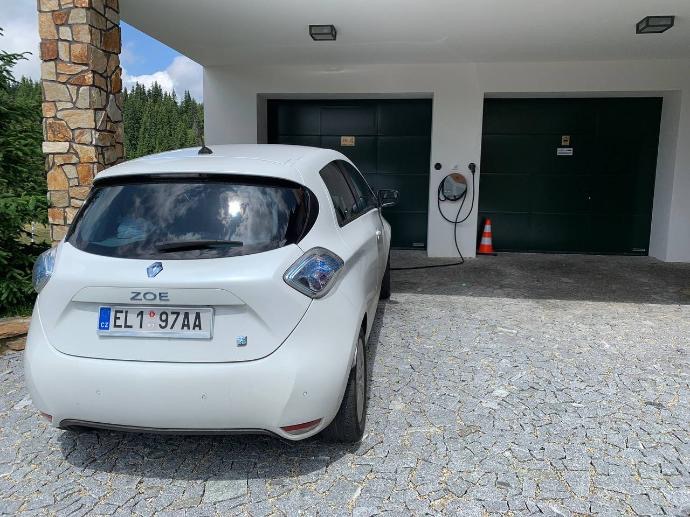
Billing for electricity consumed by the vehicle
When managing a fleet of electric vehicles, transparent accounting of electricity consumption is key to fair and efficient costs. Our systems allow you to achieve this and ensure that you pay for electricity correctly and based on actual consumption.
How does it work?
- Smart devices closely monitor your vehicles' electricity consumption. This data is the basis for calculating your electricity costs.
- You calculate electricity consumption based on the VTP..
- Electricity cost based on smart system proof or flat rate as per the PPA.
- The logbook, contractual arrangements and km are not addressed, they are only added as NP.
- If employees charge company EVs by domestic wallbox with proof information.
Fire safety
For EV fleet managers, ensuring fire safety is essential and must not be neglected. With the advent of the new 2024 directive governing fire safety in the operation of EVs, including their location in collective garages, this topic is more than timely.
Currently, it is possible to install charging stations in garages without restrictions, provided they meet the requirements of the electrical inspection. This is an important step towards promoting electromobility
Status now:
Garage over 30 vehicles - EPS or local fire detection.
Garage over 60 vehicles - EPS, SHZ, fire ventilation, separation of cabinets, fire piping.
Proposal:
Garage over 10 vehicles - EPS, SHZ, fire ventilation.
Garage over 40 vehicles - EPS, SHZ ( more powerful sprinklers), fire ventilation, wide exits.
Contact us to design a specific charging station solution for your business.
